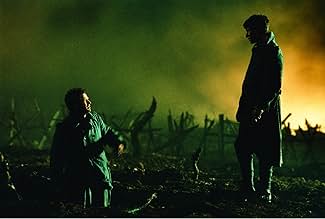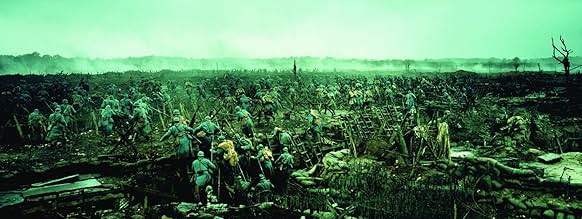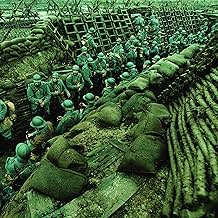VALUTAZIONE IMDb
7,6/10
77.195
LA TUA VALUTAZIONE
Una giovane tenta disperatamente di trovare il fidanzato scomparso nella regione della Somme durante la prima guerra mondiale.Una giovane tenta disperatamente di trovare il fidanzato scomparso nella regione della Somme durante la prima guerra mondiale.Una giovane tenta disperatamente di trovare il fidanzato scomparso nella regione della Somme durante la prima guerra mondiale.
- Regia
- Sceneggiatura
- Star
- Candidato a 2 Oscar
- 17 vittorie e 35 candidature totali
Jean-Pierre Darroussin
- Benjamin Gordes
- (as Jean Pierre Darroussin)
Jean-Pierre Becker
- Esperanza
- (as Jean Pierre Becker)
Jean-Paul Rouve
- Le facteur
- (as Jean Paul Rouve)
Elina Löwensohn
- La femme allemande
- (as Elina Lowensohn)
Recensioni in evidenza
A powerful and emotional war drama from French auteur Jean-Pierre Jeunet. Audrey Tautou leads us through an engaging and well-crafted story which sweeps us into the world of its characters, whom are established and well developed as the story progresses. The film itself is visually arresting with stunning cinematography. It was actually Bruno Delbonnel's visuals that acted as one of the man aspects that allured my interest in the film, it's a visual powerhouse blending the gritty conventions of war with scenes of a more romantic and dramatic style. A harrowing and emotional account of World War I from the perspective of French soldiers and civilians.
10gort-8
This is one of those times that a rating system breaks down. I gave this film a "10" only because there were no "20's" available.
This film, in its own way, seems to be able to fire on those same diverse cylinders that William Shakespeare so often did. It's a light and airy comedy. It's the bitterest of tragedies. It's a beautiful romance. It's an unfolding mystery. At it's heart it is a film of war. War, in all its boiling chaos, touches on all those experiences and more.
When I left the theater I was both elated and depressed. My elation came from having just had such a pure cinematic experience. My depression came from glancing at the marquee and reminding myself that I'll have to survive on the sort of cinema half-life provided by the pablum that normally makes it to the screen. Every now and again it's great to be reminded just how good a movie can be.
This film, in its own way, seems to be able to fire on those same diverse cylinders that William Shakespeare so often did. It's a light and airy comedy. It's the bitterest of tragedies. It's a beautiful romance. It's an unfolding mystery. At it's heart it is a film of war. War, in all its boiling chaos, touches on all those experiences and more.
When I left the theater I was both elated and depressed. My elation came from having just had such a pure cinematic experience. My depression came from glancing at the marquee and reminding myself that I'll have to survive on the sort of cinema half-life provided by the pablum that normally makes it to the screen. Every now and again it's great to be reminded just how good a movie can be.
10boboloco
This movie is better than "Amelie" (which I loved). The story is intricately plotted so people with a "Seed of Chucky" attention span will be overwhelmed. It must be the only movie to combine amazing combat scenes with romance, comedy and a complex mystery puzzle. Audrey Tatou is a goddess. Jeunet (the director) is like a combination of Chaplin (the romance and comedy); Hitchcock (the incredible camera work and storytelling); and Spielberg (the battle scenes and emotion).
As to some of the comments I have seen on this site:
There were French people complaining that people were speaking too fast. Gee, I don't speak French, but I can read subtitles just fine, so it was not a problem.
Some people complained that it was too long. Then there were people that complained it was too short. Like Goldilocks, I thought it was just right.
There were those that said that Tatou can't act. Audrey's performance was nuanced people, she's no Jim Carrey. Some said she was just playing Amelie again. Wrong. Amelie was a good-hearted but wishy-washy spirit who was afraid to take any action in her own life. Mathilde is just the opposite, somebody who believes so strongly in her convictions that she is able to follow what her heart tells her in spite of all available evidence and every single person she meets. In fact, every actor, no matter how small the role, turns in a great performance (I'm especially partial to the great Dominique Pinon, who plays Audrey's uncle).
There were complaints about the sex. There are a couple of brief shots of people having sex in the introduction, very similar to Amelie. Plus you get to see Jodie Foster doing the nasty from several directions. If that bothers you, go see Polar Express instead. Personally (especially in light of the rumors of Jodie being a lesbian) I am in favor of the sex scenes. There is also a shot of Audrey's fabulous naked booty, which justifies the price of admission all by itself.
Someone else complained that it was too jarring switching between the horrific WWI trench warfare scenes and the idyllic 1920s Paris. Argghhhh, that's the point!
Then there was the complaint about seeing a scene or shot from a different perspective later in the movie. Have you heard of a story called "Rashomon"? The idea is that you are experiencing the events from the viewpoint of different characters. This is cleverly done and never superfluous. At least one time you are quite startled by new information revealed by that shift in perspective.
All in all, this is a movie that really does have everything. If it were an American movie it would win best picture, best actress, best supporting actress (Jodie still might get nominated), best cinematography, best script from a novel, and best director. As it is scheduled for a Christmas national release, hopefully a lot of people will see it.
As to some of the comments I have seen on this site:
There were French people complaining that people were speaking too fast. Gee, I don't speak French, but I can read subtitles just fine, so it was not a problem.
Some people complained that it was too long. Then there were people that complained it was too short. Like Goldilocks, I thought it was just right.
There were those that said that Tatou can't act. Audrey's performance was nuanced people, she's no Jim Carrey. Some said she was just playing Amelie again. Wrong. Amelie was a good-hearted but wishy-washy spirit who was afraid to take any action in her own life. Mathilde is just the opposite, somebody who believes so strongly in her convictions that she is able to follow what her heart tells her in spite of all available evidence and every single person she meets. In fact, every actor, no matter how small the role, turns in a great performance (I'm especially partial to the great Dominique Pinon, who plays Audrey's uncle).
There were complaints about the sex. There are a couple of brief shots of people having sex in the introduction, very similar to Amelie. Plus you get to see Jodie Foster doing the nasty from several directions. If that bothers you, go see Polar Express instead. Personally (especially in light of the rumors of Jodie being a lesbian) I am in favor of the sex scenes. There is also a shot of Audrey's fabulous naked booty, which justifies the price of admission all by itself.
Someone else complained that it was too jarring switching between the horrific WWI trench warfare scenes and the idyllic 1920s Paris. Argghhhh, that's the point!
Then there was the complaint about seeing a scene or shot from a different perspective later in the movie. Have you heard of a story called "Rashomon"? The idea is that you are experiencing the events from the viewpoint of different characters. This is cleverly done and never superfluous. At least one time you are quite startled by new information revealed by that shift in perspective.
All in all, this is a movie that really does have everything. If it were an American movie it would win best picture, best actress, best supporting actress (Jodie still might get nominated), best cinematography, best script from a novel, and best director. As it is scheduled for a Christmas national release, hopefully a lot of people will see it.
10Libs
It is almost insulting to compare this film to Amelie Poulain. Yes it's the same crew, yes it's the same director and yes, Audrey Tautou almost plays the same character. But give JP Jeunet a break, it's part of HIS style. Would you blame Beethoven because his symphonies kinda sounded the same?
It is at times gritty, with its very tough depictions of the Great War, and at times light and naive. It all follows a very complicated storyline which is, I would have to admit, the only weakness in this otherwise perfect movie. With so many characters and so many plot elements, some people may feel a bit lost, specially toward the end. But this is of lesser concern as the audience will still follow the main idea : a quest to find a loved one. So even through all the intricacies of the subplots, the arc story (and its finale) always remain on the horizon.
To put it short, the movie is a masterpiece. The acting is strong, the scenes are breathtaking and overall, so much attention has been put to details that it feels like a labor of love more than a big production movie. I truly think that if French cinema was not so locked into producing crappy talkative movies about losers and failures, it could come up with a lot more movies as poignant as Engagement is.
It is at times gritty, with its very tough depictions of the Great War, and at times light and naive. It all follows a very complicated storyline which is, I would have to admit, the only weakness in this otherwise perfect movie. With so many characters and so many plot elements, some people may feel a bit lost, specially toward the end. But this is of lesser concern as the audience will still follow the main idea : a quest to find a loved one. So even through all the intricacies of the subplots, the arc story (and its finale) always remain on the horizon.
To put it short, the movie is a masterpiece. The acting is strong, the scenes are breathtaking and overall, so much attention has been put to details that it feels like a labor of love more than a big production movie. I truly think that if French cinema was not so locked into producing crappy talkative movies about losers and failures, it could come up with a lot more movies as poignant as Engagement is.
An epic love story on a World War I background. Far from Amelie, the team Jeunet/Tautou demonstrates his talent, showing with poetry love and war, beauty and horror, sweetness and violence. Mathilde and Manech, played by the stunning Audrey Tautou and the new French heart-throb Gaspard Ulliel, are the ideal lovers, determinate, passionate, separated by destiny, hoping...because hope is the message, the only one of a film where love is giving and giving again. If you loved Cold Mountain you will adore "A very long engagement". If don't know yet what it is to hold someone's heart in your hand, to feel the beatings of somebody's heart like the Morse alphabet, this movie will explain it to you, and you never will be the same anymore.
Lo sapevi?
- QuizWhen casting Jodie Foster, Jean-Pierre Jeunet met her in Paris at the café which was used to shoot the scenes in Il favoloso mondo di Amélie (2001) which is near where he lives. Some tourists were at the café, knowing it was featured in the film, asked Jeunet and Foster to move out of the way (not recognizing them) so that they could take a photograph of the café.
- BlooperIn the film there is an important storyline about an albatross. However, throughout the film in all footage depicting the albatross a gannet is shown. Though a gannet is also a large seabird, it looks nothing like an albatross.
- Citazioni
Ange Bassignano: [writes] "Revenge is pointless. Try to be happy and don't ruin your life for me."
- ConnessioniEdited from Il popolo migratore (2001)
- Colonne sonoreÇa ne Vaut pas l'Amour
Music by François Perpignan
Lyrics by Alexandre Trébitsch
Performed by Esther Lekain
I più visti
Accedi per valutare e creare un elenco di titoli salvati per ottenere consigli personalizzati
- How long is A Very Long Engagement?Powered by Alexa
Dettagli
- Data di uscita
- Paesi di origine
- Lingue
- Celebre anche come
- A Very Long Engagement
- Luoghi delle riprese
- Héaux de Bréhat, Côtes-d'Armor, Francia(lighthouse exteriors)
- Aziende produttrici
- Vedi altri crediti dell’azienda su IMDbPro
Botteghino
- Budget
- 56.600.000 USD (previsto)
- Lordo Stati Uniti e Canada
- 6.524.389 USD
- Fine settimana di apertura Stati Uniti e Canada
- 101.749 USD
- 28 nov 2004
- Lordo in tutto il mondo
- 69.424.389 USD
- Tempo di esecuzione
- 2h 13min(133 min)
- Colore
- Mix di suoni
- Proporzioni
- 2.35 : 1
Contribuisci a questa pagina
Suggerisci una modifica o aggiungi i contenuti mancanti

























